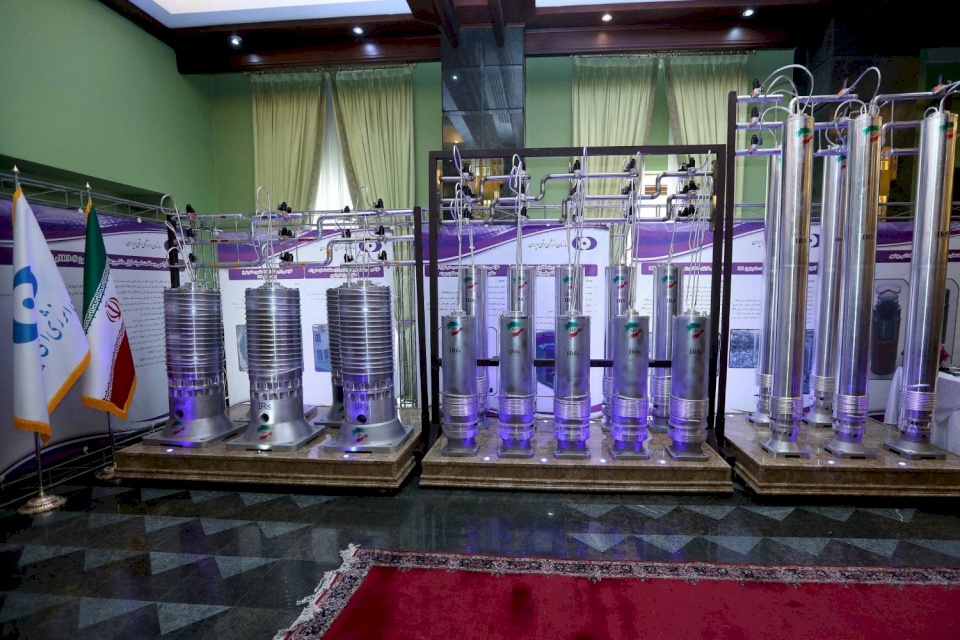
Moscow: Washington and Tehran Have Taken the Russian Proposal to Transfer Excess Uranium from Iran Seriously
SadaNews - The Russian Foreign Ministry said on Friday that Washington and Tehran have seriously considered the Russian proposal regarding the transfer of excess uranium from Iran.
It added that "Iran insists on its right to enrich uranium on its territory," proposing that "Iranian enriched uranium be made a commercial product."
The statements were made by Russian Deputy Foreign Minister Sergey Ryabkov, who was quoted by Russian media saying that "the proposal from Russia regarding the transfer of excess uranium from Iran has been taken seriously by Washington, Tehran, and the International Atomic Energy Agency."
Ryabkov emphasized in a statement to the Novosti agency that the matter has not yet entered into details.
He added: "We have conveyed this proposal to both the Iranian and American sides, and the International Atomic Energy Agency is also aware of it. Its idea is to solve two problems at once: first, the Iranian side is firmly insisting on the importance of maintaining the right to carry out enrichment activities on its territory. The second is that we see that there are opponents of Tehran who express their serious concerns about the accumulation of enriched uranium in Iran beyond the levels usually used for manufacturing fuel for nuclear reactors."
Ryabkov pointed out that if Russia can transfer these materials and carry out the required work to produce fuel from them or manage them in a way that makes them a commercially viable product, it would effectively solve both problems at once.
The deputy minister continued: "Since it is still unclear how the dialogue will evolve, whether it will take place at all, and if it does, in what format, we have not yet reached the details for executing this process. But all parties involved have treated this matter with interest, and perhaps we can say that they have considered it a reflection of the seriousness of our efforts and intentions in this regard."
Earlier, Iranian Foreign Minister Abbas Araqchi confirmed in an interview with the French newspaper "Le Monde" that his country is proceeding with uranium enrichment and will not abandon its missile program, describing it as an integral part of its defensive and deterrent capabilities.
Russian Foreign Minister Sergey Lavrov had previously stated that Russia is ready to assist in transferring excess quantities of enriched uranium outside of Iran for later processing and peaceful use.
Before this, Iranian Parliament Speaker Mohammad Baqer Qalibaf reported that his country had issued a law suspending its cooperation with the International Atomic Energy Agency, asserting the impossibility of continuing cooperation with the agency until the safety of Iran's nuclear facilities is guaranteed.
Experts from the American agency behind the penetrator bombs used in the June attack on the three most important Iranian nuclear facilities stated on Thursday that they are still awaiting accurate data on the extent of the damage inflicted on the facilities as a result of the strikes.
Officials from the Defense Threat Reduction Agency told reporters in a press briefing that they currently do not have details regarding whether the bunker-busting munitions penetrated the depth they were intended for.
Israel attacked Iran on June 13, stating it was an effort to cripple the Iranian nuclear defense program. Iran has confirmed that it is not developing nuclear capabilities except for peaceful use.
The two countries agreed to a ceasefire after 12 days of fighting following the U.S. bombing of the three nuclear facilities in Isfahan, Natanz, and Fordow with 14 GBU-57 bunker-busting bombs as part of what was termed "the Night Hammer Operation."
The extent of the damage sustained by Iranian nuclear facilities has been a subject of contention since then.
U.S. President Donald Trump spoke about a "complete obliteration" of the facilities.
However, a preliminary secret assessment conducted by the U.S. Defense Intelligence Agency, reported by U.S. media, indicated that the Iranian nuclear program may have been delayed by only a few months.
The White House strongly criticized the release of the report's findings, describing them as "fake news."

Tehran: Classifying the "Revolutionary Guard" as a Terrorist Organization is a "Strategic...

US Sends Additional Warship to the Middle East Amid Tensions with Iran

Europe Punishes 17 Iranian Officials Including the Interior Minister and the Attorney Gene...

Turkey Intensifies Mediation Efforts Between Iran and the US

Casualties in Russian Attack on Ukraine as America Acknowledges Negotiation Difficulties

The European Union Moves Towards Classifying the Iranian Revolutionary Guard as a 'Terrori...

Army and Police in Venezuela Pledge Loyalty to Acting President Rodríguez

